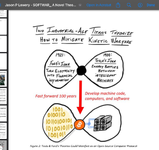I agree that the network effect itself is Bitcoin's most powerful asset (it's only asset really - being that it's the only thing that separates Bitcoin from any number of near-technically identical shitcoins)
The Turkish Lira is technically identical to the US dollar.
What do you think will happen to the network as mining rewards continue to decrease and electricity costs increase?
Are electricity costs actually increasing? Or, is it the currency that is losing value. What about priced in bitcoin?
Past a certain point, will there be any incentive whatsoever for miners to maintain the backbone of the network and verify transactions?
Once there is no block subsidy, miners will be rewarded with fees alone. If bitcoin becomes the dominant money, fees should be enough to provide incentive for mining. If fees are too low, then miners using more expensive electricity and less efficient miners will shut off, and the remaining miners will capture that share of the market, and become more profitable.
And is there any point at which it would become more profitable for miners to essentially sabotage the network or the protocol itself rather than to continue mining under the original framework? (This is a genuine question, as I've heard criticism focused on such a scenario, but don't quite understand the underlying mechanism by which a large pool of miners would attempt such an action, nor the precise situation which might incentivize them toward such a seemingly risky gamble).
Bitcoin rewards selfishness aka self-interest. People acting in their own self interest is the best way for society to operate smoothly. Mother Teresa was acting in her own self interest by helping others, because it gave her life fulfillment, purpose and meaning.
Miners can always choose to attack the network.
They can either
A) make lots of valuable Bitcoin by mining within the consensus rules, and securing the network, or
B) Attack the network, and if they succeed, they get lots of Bitcoin that now has less, or no value
So a rational actor would not choose to attack the network because they would just become poor. What about a government?
Let’s say China devotes all its resources to buying mining hardware. What happens to the price of the hardware? Supply and demand. Miners get 5x, 10x as expensive. China spends 5 years and $1 trillion buying miners, plugs them in and spends $500M a day in electricity to launch an attack. Hash rate doubles overnight. For the next 2 weeks until the difficulty adjustment, Blocks are coming every 5 minutes, and the Chinese are making $1 billion a day in subsidy and fees.
Again they have a choice:
A) follow the rules and secure the network, and make $billions in BTC or
B) attack the network, destroy the value of BTC, and lose 5 years worth of 100% GDP expended to do it, with basically nothing to show for it
if they choose option B, destroy it even if it requires suiciding the empire, bitcoin users might just decide to hardfork, use a different hashing algorithm, and neuter the chinese Miners.
The incentives of Bitcoin are to support it. Even if an irrational actor attacked, it is likely they would just impoverish themselves and not succeed anyway.



